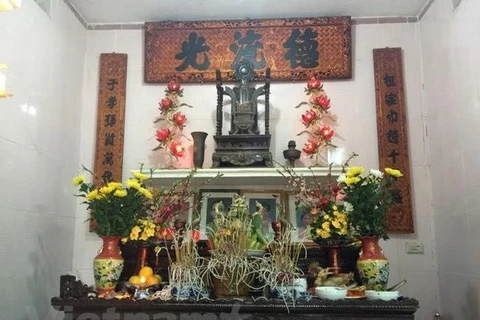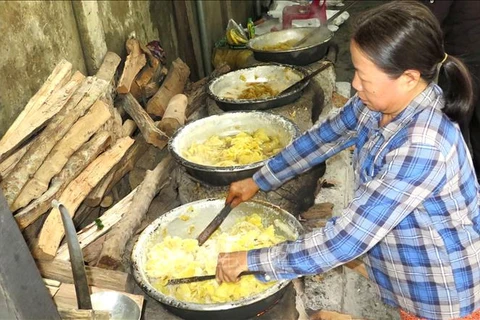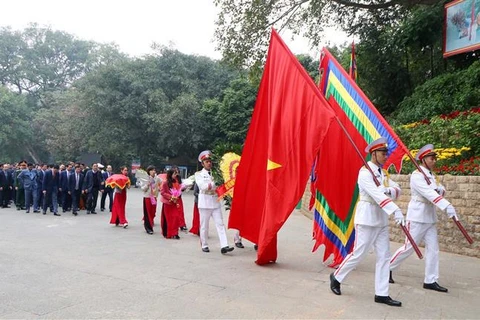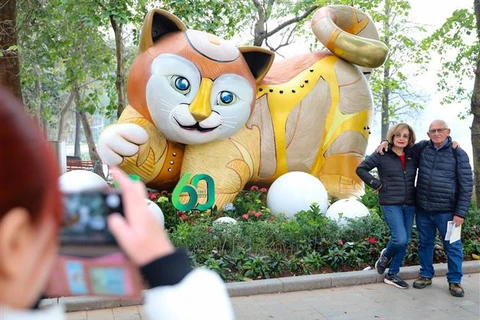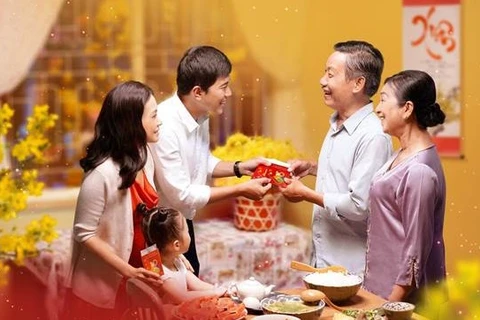Hanoi (VNA) - Ancestor worship, a longstanding belief and fine tradition of the Vietnamese people, is a ritual practice paying tribute to deceased family members that reminds people of their roots.
During the Lunar New Year festival, Vietnamese at home and abroad carefully cook traditional dishes to put on the home altar to worship their ancestors.
The practice also reflects the influence of patriarchy and Confucianism on the Vietnamese culture.
Since Confucianism was introduced to Vietnam during the Chinese domination, filial piety, the most fundamental of Confucian values, is very influential and important to Vietnamese families.
Accordingly, children are obliged to respect their parents in life and to remember them after they die. The practice of ancestor worship is thus an expression of filial piety toward deceased parents, relatives and ancestors.
Most Vietnamese families have an ancestral altar positioned in a prominent place of the house.
The ancestral altar is set with ancestral tablets and pictures, together with an incense urn in the centre as a symbol of the stars. Inside the urn usually stands a circular incense stick that represents the universe. Two candles are placed on the sides of the altar to embody the sun (left) and the moon (right).
On special occasions like ancestors’ death anniversaries or the Lunar New Year, special rites are performed to communicate with the dead. The rites consist of making offerings of fruits, foods and wine; lighting the candles; and burning incense before praying in front of the altar.
Tet, or Lunar New Year, is the most important festival of the year for Vietnamese people and a time for family reunion. It is an opportunity for descendants to invite the souls of their ancestors to join the family’s Tet celebration.
A tray of fruit is an indispensable item placed in the centre of the altar of every family during Tet. Depending on the customs of each region, residents choose different varieties of fruit. For example, northerners usually prefer bananas, apples, oranges, a pomelo, peaches, papayas, and chilies to display on the altar.
 A tray of fruit is an indispensable item placed in the centre of the altar of every family during Tet (Photo: VietnamPlus)
A tray of fruit is an indispensable item placed in the centre of the altar of every family during Tet (Photo: VietnamPlus) The fruit may include a bunch of bananas, pomelo, persimmon, pear and tangerine in different colours to represent the desire for “phu” (prosperity), “quy” (notability), “tho” (longevity), “khang” (health) and “ninh” (peace).
Elsewhere, people from the central region do not care about what kind of fruits are displayed on the altar as for them the most important aspect of the ritual is to respect their ancestors.
Moreover, it is the habit of many families to display artificial flowers made of paper, plastic, silk, or other materials on the altar, for economic reasons. However, followers of Feng Shui point out that displaying artificial flowers does not mean respecting ancestors.
The altar may also be decorated with a branch of peach blossoms in warm pink to drive away evil spirits and bad luck.
The ancestral altar occupies a prominent place in every Vietnamese home, no matter whether the family is rich or poor. It is a manifestation of the country’s culture that shows its respect for all the past, the present day, and the future./.

